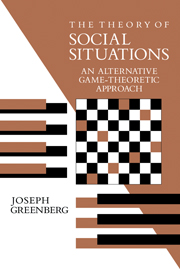Book contents
- Frontmatter
- Contents
- Preface
- 1 Overview
- 2 The theory of social situations
- 3 Examples
- 4 Abstract stable sets
- 5 Existence and uniqueness of OSSB and CSSB
- 6 Characteristic function form games
- 7 Normal form games
- 8 Extensive form games with perfect information
- 9 Infinitely repeated games
- 10 Implementation by means of situations
- 11 Closing remarks
- References
- Index
- Frontmatter
- Contents
- Preface
- 1 Overview
- 2 The theory of social situations
- 3 Examples
- 4 Abstract stable sets
- 5 Existence and uniqueness of OSSB and CSSB
- 6 Characteristic function form games
- 7 Normal form games
- 8 Extensive form games with perfect information
- 9 Infinitely repeated games
- 10 Implementation by means of situations
- 11 Closing remarks
- References
- Index
Summary
The purpose of this book is to offer a new and integrative approach, in the spirit of game theory, to the study of formal models in the social and behavioral sciences.
Following Proclus' aphorism that “it is necessary to know beforehand what is sought,” the objective of this first chapter is to convey the general ideas behind the proposed theory, and present some of its advantages; the rigorous definitions, complete explanations, the precise underlying motivation, and, of course, the formal results are provided in the next chapters. The reader should not, therefore, expect to master the theory and comprehend its ramifications by glancing at this chapter; its purpose is limited to give the heuristic gist of the theory.
The scope of the theory
The proposed theory applies to all those models in the social and behavioral sciences in which it is impossible to impose a course of action, or an alternative, on the individuals. Rather, I consider only those social environments in which a course of action can be recommended, or proposed, to the individuals, who are then free to accept or reject the proposal. (The source of the recommendation is inconsequential. It might be one, some, or all of the individuals, or, alternatively, the recommendation can be made by an “outside expert,” say the social scientist. The crucial point to recall is that the proposer is not a dictator; he has no power to enforce his recommendation.)
Information
- Type
- Chapter
- Information
- The Theory of Social SituationsAn Alternative Game-Theoretic Approach, pp. 1 - 8Publisher: Cambridge University PressPrint publication year: 1990
